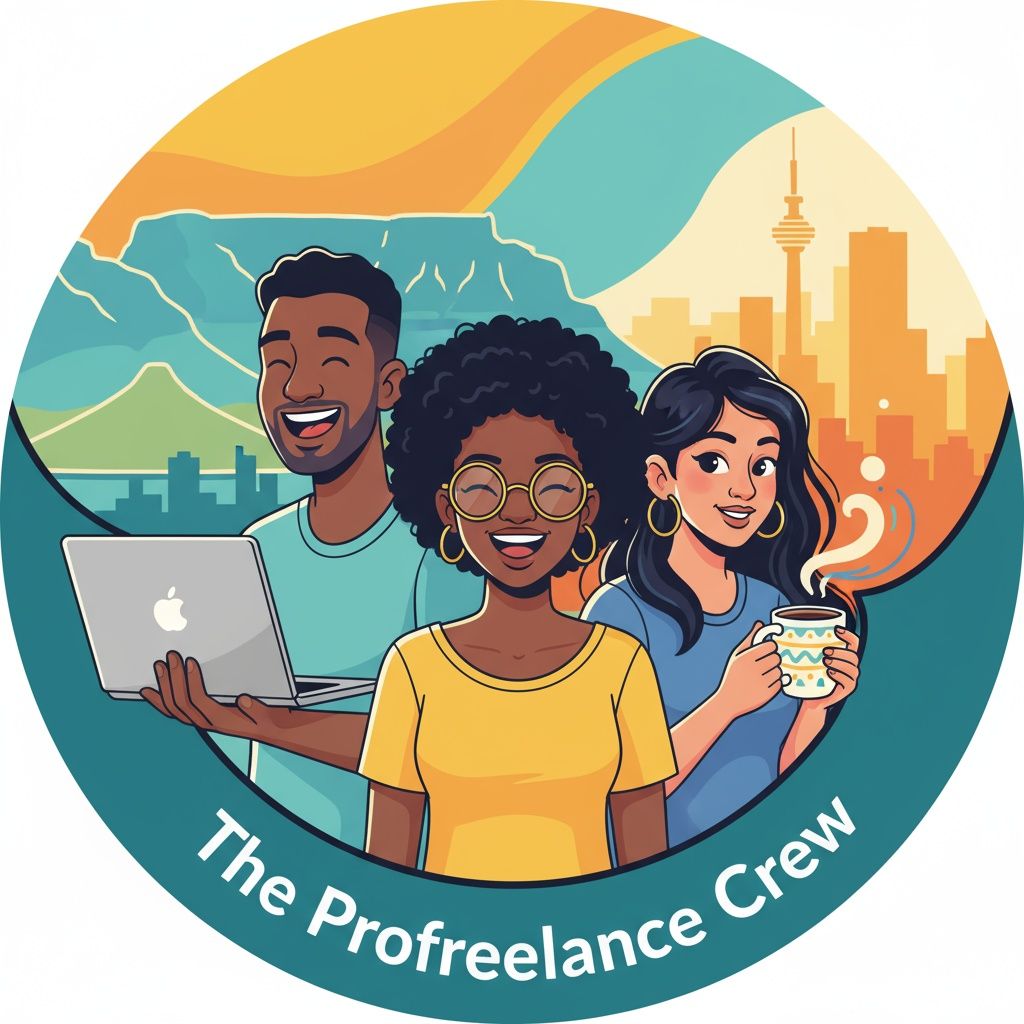Hey Freelance Friends!
I didn’t call Rain SA multiple times to give them any sort of positive feedback (That day might never come). I called because their WiFi was absolutely shocking. The kind of shocking that makes you genuinely wonder if someone unplugged the tower to boil a kettle. It was unusable. Every website buffering. Every app freezing. Every task taking ten times longer than it should.
So I did what any reasonable person does: I phoned them. Then I phoned again. And again. And again. Because when something irritates me enough, I become a one-woman complaints department.
Except every single time, the same thing happened. The line was terrible. The call quality sounded like it was travelling through three oceans and a thunderstorm. They couldn’t hear me, I couldn’t hear them, and we were trapped in a loop of repeating ourselves until one of us gave up. And here’s the part that stood out the most: not once, not once, did I get a South African agent.
Every call went offshore…
Sponsored

Ready to land more gigs and get paid your way? Join Fiverr, where thousands of South African freelancers are turning skills into steady cash.
Your next big project (and pay day) is just a click away!
To make it very clear: this is not about the Philippines. The people on the other end were kind, patient, and doing their jobs. This is not about them. This is about Rain, a company operating in one of the most unemployed countries in the world, marketing themselves as proudly South African, and then outsourcing local work to cut costs, even when the service quality drops off a cliff.
That’s the part that got under my skin. Because after the third or fourth terrible call, I found myself sitting there thinking: how are South Africans expected to “work harder,” “skill up,” “be employable,” and “stay competitive” when local companies don’t even want to employ the people who are already skilled? How are we supposed to fix a problem that we didn’t create?
We are constantly fed the same narrative. If you don’t get hired, it’s because you need more certifications. If you don’t get opportunities, it’s because you must “improve your value.” If you’re struggling to find work, it’s because you should “adapt to global trends.” And freelancers hear it even louder: you’re not booked because you must “market better,” “learn more,” “stand out,” “innovate,” “do more.”
Meanwhile, the truth is sitting there in plain sight: South Africans are not the issue. The skills exist. The experience exists. The talent exists. The hunger exists. People are building entire careers from kitchen tables, running businesses off their phones, delivering world-class work to international clients, but somehow they’re not hireable for jobs in their own country?
No. The issue is companies who profit from South Africa but refuse to invest in South Africans.
Offshore labour is cheaper. That’s the only reason they do it. Not because we lack ability. Not because we lack qualifications. Not because we’re less capable. It’s because “cheap” will always win in the eyes of corporations, even when customers suffer for it. And the suffering is not subtle. We can hear it in every dropped call. We feel it every time support can’t resolve issues. We experience it every time a company chooses profits over people.
The worst part is how normalised it’s become. Nobody blinks. Nobody questions it. We just accept that local companies outsource while the country’s unemployment figures multiply. We accept that students graduate into thin air. We accept that freelancers must compete with people earning a fraction of South African living costs. We accept that “do better” is a reasonable instruction in an unreasonable system.
But we shouldn’t have to accept it. We shouldn’t have to work twice as hard to compensate for companies that refuse to hire the people keeping their business alive. It shouldn’t be on us to fix a system that actively undermines us.
And that’s why I’m talking about it. Because staying quiet protects the corporations, not the workers. And freelancers need to understand this for what it is: not a personal failure, but a structural one. Not a talent gap, but a hiring choice. Not “globalisation,” but cost-cutting dressed up as strategy.
Calling this out isn’t negativity, it’s honesty. South Africans are skilled. We are capable. We are employable. And we shouldn’t have to prove our worth beyond that.
Company Accountability Checklist for South African Freelancers
(Print it. Screenshot it. Save it. Use it.)
These are simple, powerful questions to help you figure out whether a company actually values South African talent, or just wants your skills for cheap while outsourcing everything else.
Answer honestly. Trust your gut.
✔️ 1. Do they actually hire South Africans, or only sell to us?
If almost all their customer-facing roles are offshore
→ They don’t invest locally.
✔️ 2. Do they pay fairly, or do their rates scream “exploitation”?
If the rate is something you couldn’t survive on in South Africa
→ They’re benchmarking you against another country, not this one.
✔️ 3. Do they respect your time and boundaries?
If they expect 24/7 availability
→ They’re treating you like outsourced labour, not a partner.
✔️ 4. Do they communicate clearly?
Confusion, vague briefs, and last-minute chaos
→ Usually a sign that you’re one of many contractors they cycle through.
✔️ 5. Do they blame you for structural problems?
Lines like:
“You must adapt,” “You should be grateful,” “You must work harder,”
→ Big red flag.
✔️ 6. Do they value lived experience and local insight?
Companies that care will WANT South African voice, context, humour, culture, and perspective.
If they don’t?
→ They want the cheapest option, not the best option.
✔️ 7. Do they offer real collaboration, or just throw tasks at you?
Real collaboration = treating you like a professional.
Task dumping = treating you like a replaceable cog.
✔️ 8. Do they keep their promises?
Payment dates, feedback, timelines, deliverables.
If they don’t honour their side
→ That’s not a hiring issue, that’s a values issue.
✔️ 9. Do they support SA creators, workers, and freelancers publicly?
Silence on every local issue
→ Usually reflects silence in their hiring practices too.
✔️ 10. Does working with them feel empowering… or draining?
Your body always knows before your brain does.
⭐ The Goal of This Checklist
Not to judge companies.
Not to shame employees.
But to help you see clearly:
Who is genuinely investing in South African talent, and who isn’t.
Because you deserve to work with companies who respect your skill, value your time, and see you as more than a cheap alternative.
We will be cancelling our Rain SA subscription.
— The Profreelance Crew

🛠️ Tool of the Week: Fairwork Ratings

Because if companies won’t hold themselves accountable, we’ll do it for them.
If this week’s Rain saga taught us anything, it’s that South African workers are tired of being told to “work harder” while companies do the bare minimum. That’s why Fairwork Ratings is the perfect tool for today’s newsletter.
Fairwork is an independent research project that investigates digital labour platforms around the world, including South Africa, and scores them on things like:
Fair pay
Fair conditions
Fair management
Fair contracts
Fair representation
In simple terms:
They tell you which companies treat workers like humans… and which ones treat workers like disposable labour.
It’s like a report card for corporate ethics.
And trust me, some of the results will make your jaw drop.
Before you sign up with a platform, partner with an app, or start freelancing for a company, check whether they respect workers or just exploit them. Fairwork gives you the receipts, not the PR.
Because if businesses are going to operate in South Africa, profit off South Africans, and claim to “support the economy,” the least they can do… is prove it.
Interesting Reads Recommended by Profreelance (If you’re looking for more reading)
Resource Archive
🔗 Sign up for Fiverr - Powerful Freelance Platform
🔗 Freelance Rate Calculator Bot - AI Chat Bot created just for SA Freelancers
🔗 Clockify - World’s #1 free time tracker trusted by millions.
🔗 Freelancer Spotlight - Be considered to be featured in an upcoming issue of Freelance Forward
🔗 Freelancer Stalker Mode Tracker - Notion template used to study your competitors ethically
🔗 Pumble - Free all-in-one team communication app
🔗 Proposal Assistant Bot - This little legend drafts your proposals for you

PROFREELANCE (Pty) Ltd
2023/279056/07
The content in this newsletter is for informational purposes only and does not constitute financial, legal, or professional advice. Pro Freelance and Freelance Forward are not affiliated with or endorsed by the platforms or tools mentioned (unless stated otherwise), and we are not liable for any losses, damages, or issues arising from your use of them. Always do your own research before making decisions related to your freelance business.




